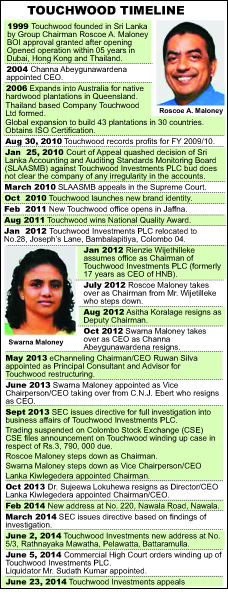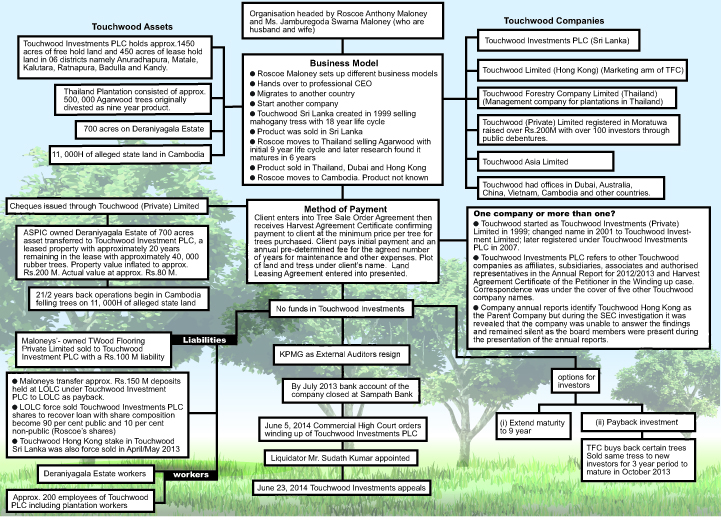
Aitken Spence joins up with Spanish chain to start a new hotel in Ahungalla under BOI.
Aitken Spence partners with RIU Hotels Spain to build USD 100mn resort in Ahungalla spearheading the first business model around Southern development.
Aitken Spence PLC entered into an agreement with the Board of Investment of Sri Lanka (BOI) to set up a five star Luxury Resort in Aungalla. This agreement was signed by the Chairman of the BOI, Dr. LakshmanJayaweera and the Directors of Aitken Spence MalinHapugoda and VipulaGoonathilake.
Aitken Spence PLC will launch the first business model involving the Southern Highway and the Mattala Airport by investing in a USD 100 million beach resort in Ahungalla to be managed by an international hotel chain. The 5 story 500 roomed 5 star luxury resort which will be managed by RIU Hotels, Spain, would also be a first for the Spanish chain, being their inaugural project in the Asia Pacific region.
"The timing of the hotel's opening will be right since the Southern Highway to Hambantota is expected to reach completion by then and we have the Mattala Airport facility already in place, giving us the perfect mix for our business model. Aitken Spence has always encouraged infrastructure development in the country and our investment is proof of our confidence and support of the Government's development plans" said RajanBrito, Deputy Chairman of the Group.
The Aitken Spence management is also of the opinion that the private sector needs to develop business modes of this nature, which are in line with the Government's vision for the country's development.
BOI stated, "BOI is very pleased that this project will be started in Ahungalla. The policy of the Government is to get 2.5 Million tourist arrivals by 2016. Hence hotel room capacity needs to be increased to meet growing demand"
The project will also be unique in its concept, since it will introduce Charter flights to the country. The hotel which would cater to high end customers looking for long stay vacations will arrive on Boeing 787 Dreamliner charters which can carry up to 200 – 300 passengers at a time. RIU Hotels is an all-inclusive model which has seen international success across 107 properties managed by them in 16 countries.
This business model spearheaded by the Group would also have a snowball effect in developing the tourist industry, particularly in the Deep South of the country.
"This would be a huge boost to the tourism sector as 700 - 800 guests coming into the country in one go would help in creating international awareness of Sri Lanka as an emerging holiday destination in Asia" says the Deputy Chairman.
www.island.lk
Aitken Spence PLC will launch the first business model involving the Southern Highway and the Mattala Airport by investing in a USD 100 million beach resort in Ahungalla to be managed by an international hotel chain. The 5 story 500 roomed 5 star luxury resort which will be managed by RIU Hotels, Spain, would also be a first for the Spanish chain, being their inaugural project in the Asia Pacific region.
"The timing of the hotel's opening will be right since the Southern Highway to Hambantota is expected to reach completion by then and we have the Mattala Airport facility already in place, giving us the perfect mix for our business model. Aitken Spence has always encouraged infrastructure development in the country and our investment is proof of our confidence and support of the Government's development plans" said RajanBrito, Deputy Chairman of the Group.
The Aitken Spence management is also of the opinion that the private sector needs to develop business modes of this nature, which are in line with the Government's vision for the country's development.
BOI stated, "BOI is very pleased that this project will be started in Ahungalla. The policy of the Government is to get 2.5 Million tourist arrivals by 2016. Hence hotel room capacity needs to be increased to meet growing demand"
The project will also be unique in its concept, since it will introduce Charter flights to the country. The hotel which would cater to high end customers looking for long stay vacations will arrive on Boeing 787 Dreamliner charters which can carry up to 200 – 300 passengers at a time. RIU Hotels is an all-inclusive model which has seen international success across 107 properties managed by them in 16 countries.
This business model spearheaded by the Group would also have a snowball effect in developing the tourist industry, particularly in the Deep South of the country.
"This would be a huge boost to the tourism sector as 700 - 800 guests coming into the country in one go would help in creating international awareness of Sri Lanka as an emerging holiday destination in Asia" says the Deputy Chairman.
www.island.lk



